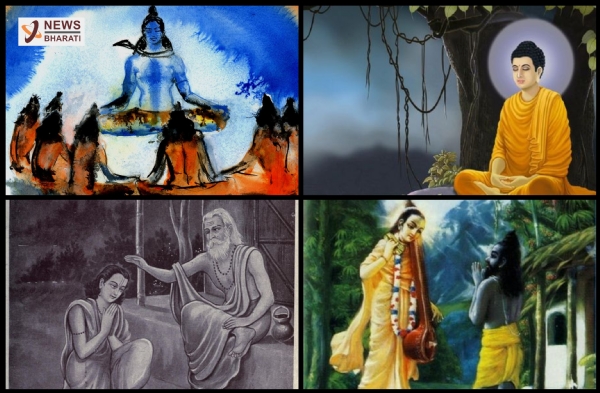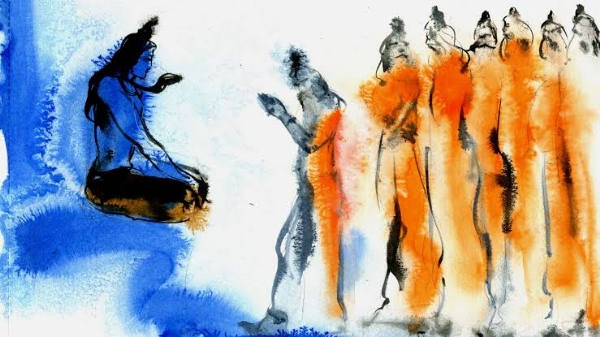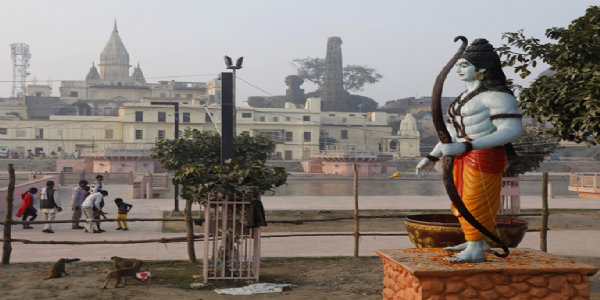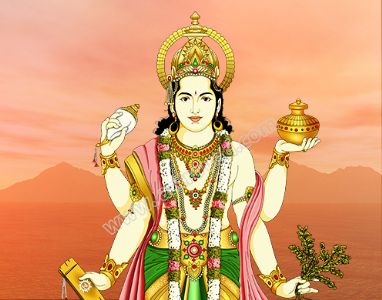Ancient events that took place on the day of Guru Purnima
On the very next full moon day, the yogi turned south and sat as a Guru to these seven men and thus Shiva, the Adiyogi (the 1st yogi) thus became the Adi Guru.
Total Views | 351
Guru Purnima (गुरु पूर्णिमा), is traditionally celebrated by Hindus and Buddhists to revere their spiritual and academic teachers. It is celebrated on Ashadha Shukla Purnima (day of full moon) of the Hindu calendar. On this day, disciples express their gratitude towards their teachers by offering puja (worship) or pay respect to their Gurus.

The word Guru is derived from two root words in Sanskrit, i.e., Gu (darkness or ignorance) and Ru (remover of the darkness). Therefore, one who leads us from darkness (ignorance) to light (jnana/knowledge) is known as Guru. In addition to having religious importance, Indian academics celebrate this day by thanking their teachers as well as remembering past teachers and scholars.
There have been a few instances that took place on the day of Guru Purnima. Here are few-
1. Lord Shiva, the first Guru
According to yogic tradition, the day is celebrated as the occasion when Lord Shiva became the first Guru by starting teaching yoga to the Saptarishis.

It is believed to be the day when Lord Shiva became the Adi Guru or the 1st Guru. The story goes that over 15,000 years ago, a yogi appeared in the upper regions of Himalayas. Nobody knew what his origins were. But his presence was extraordinary so people gathered. He did not show any signs of life, however, but for the occasional tears that rolled down his face. People started drifting away but seven remained. When he opened his eyes, they pleaded with him, wanting to experience whatever that was happening to him.
He dismissed them, but they persevered. He finally gave them an easy preliminary step and again shut his eyes. The seven men began to prepare. Days converted into weeks, then months, years, but the attention of the yogi did not come back to them.
After 84 years of sadhana, the yogi looked at them again. They had become wonderfully receptive. He couldn't ignore them anymore. On the very next full moon day, the yogi turned South and sat as a Guru to these seven men. Shiva, the Adiyogi(the 1st yogi) thus became the Adi Guru. The seven disciples became the Saptarishis and took the knowledge across the world. In the yogic tradition, Guru Purnima is sacred because the Adi Yogi opened up the option of conscious evolution for a human being.
2. Vyasa Purnima marks the birthday of Veda Vyasa
The full moon day of Ashadh, the fourth month of Hindu year is known as Vyasa Purnima because it is the birth anniversary of Sage Vyasa. It is to him we owe the Vedas, codified and handed down to us. Had he not reproduced the Vedas about 5000 years ago, we would have lost the teachings of the four Vedas which were revealed in the very beginning of the world.
He's therefore called Veda-Vyasa, the supreme Guru and his birth anniversary celebrated as Guru Purnima. It is a day that symbolizes the giving of eternal wisdom.
3. Meeting of Vyasa and Narada
There’s another legend associated with this day. After Vyasa arranged, edited and composed the four Vedas, many centuries and eons passed. Veda is the highest wisdom, so Vyasa had hoped millions will win moksha using Vedas and fulfil the final goal of their lives. But that didn't happen. Very few attained final goal with the Vedas. Distraught on account of this and feeling that his life and its labour was a waste, Vyasa sat on the banks of Saraswati looking at the setting sun and shedding tears. Narada appeared there and enquired why he was so sad, Vyasa shared his woes. Narada said, ‘Don't worry. You can fix this. You know why people did not take to Vedas? It’s because they have no rasa, no stories. And most people work from the heart and not the head.’
"Now what should I do?" Vyasa asked.
Narada said rewrite the Vedas in the form of stories and they will be a hit; people will follow dharma and attain to the ultimate by gaining the wisdom through stories. So Vyasa wrote Puranas. To him, Narada offered this priceless wisdom. Vyasa - Narada meeting happened on Guru Poornima. We remember these two teachers on this day.
4. Buddha
In Buddhist tradition the day is celebrated in honor of the Lord Buddha who gave His first discourse called the Dhammacakkappavattana Sutta to the five monks (first five disciples) on Asadha Shuklapaksha Purnima at Sarnath.






